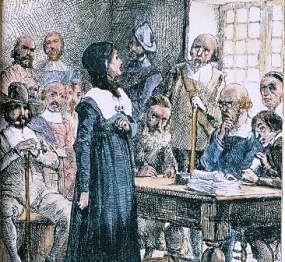
In only four years of residence, Anne Hutchinson had a considerable impact on religion and society in the Puritan colony of Massachusetts Bay. Born in Lincolnshire, England in 1591, Anne Marbury was the precocious daughter of a midwife and a clergyman who preached the Puritan faith, which was a reform or dissident movement with the official Protestant Anglican Church of England. In 1634, Anne, her husband William Hutchinson, a successful merchant, and their twelve children joined large numbers of people immigrating to Boston, capital of the Massachusetts Bay colony, to practice the Puritan religion, which was increasingly under attack from the Anglican Church. A skilled midwife, when midwifery included counseling and spiritual guidance, Anne rapidly developed respect and popularity among the women of the settlement. Following the lead of her well regarded minister John Cotton, she espoused the Covenant of Grace, which stressed God's free gift of salvation to people who believed in the saving grace of Christ. According to Anne's understanding of the covenant, a person's public conduct was not necessarily an indication of their salvation. While the Covenant of Grace was recognized as standard Puritan doctrine, many Massachusetts Bay leaders -- in what became a pivotal theological wedge between Anne and her opponents -- also considered meritorious behavior, Bible study and reflection as a strong suggestion that somebody had received grace, the pathway to eternal life in heaven. Anne disdained these views, arguing they advanced a Covenant of Works, or the concept that individuals could earn salvation. Additionally, Anne believed that once a person received grace they acquired an inner holiness which guided their actions, and they were no longer subject to human laws and officials. Some Puritan officials feared that this element of Covenant of Grace religious outlook, if taken to its logical conclusion, jeopardized the authority of magistrates, clergy and all forms of government. Anne Hutchinson was a woman of extraordinary intelligence and energy, gifted with a captivating personality that drew people toward her. Her stature was enhanced among Puritans by a superior knowledge of the Bible, developed over years of study and reflection, when the scriptures were viewed as the source of religious and moral teaching. Anne also possessed a bold intellectual and spiritual inclination which was not constrained by the practical considerations of where her religious sentiments might lead, following a Puritan tradition -- exemplified by her father, among others -- of placing adherence to religious convictions above personal concerns. These special qualities, which magnified the strength of her beliefs, created a threat to the established order. In 1636, she commenced a series of women's meetings in her home to discuss the minister's weekly sermons, a standard activity among Puritan women in America and England. The gatherings developed into popular forums, and soon attracted men as well as women listeners at a time when questions of faith, grace and salvation were pre-occupations for Puritans. Hutchinson's views and her growing reputation as a leader -- when women were not allowed to speak or teach in public -- were understood as a threat to the stability of the small colony by Puritan officials, notably Governor John Winthrop. These Massachusetts Bay leaders feared that Anne's beliefs would divide the settlement along theological lines; they were especially disturbed by Anne's claims that she could determine which of the colony's clergymen and residents had received grace. Charged as a heretic, Anne was hauled before the colony's General Court in November 1637, and for two days defended herself skillfully, matching Biblical references and wits with Winthrop and other accusers. But as the trial approached its conclusion, Anne claimed that God had communicated with her through "an immediate revelation" that he would curse the Puritans and their descendants if they harmed her. The court seized on what it regarded as a blasphemous claim to special intervention by God on her behalf to return a guilty verdict, and Anne was sentenced to banishment, forsaken even by her former spiritual mentor John Cotton, and forced into exile in nearby Rhode Island. |
Last updated: March 31, 2012
